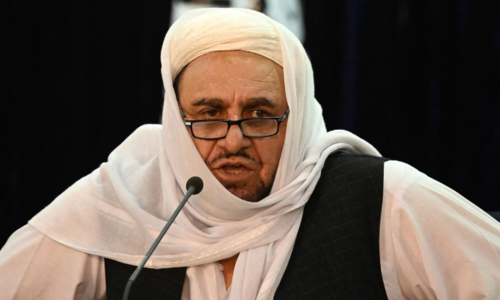WHEN the Afghan Taliban swept into Kabul last month, there were fears within the country as well as abroad that the insurgents would return to the ways of old, imposing the brutal code that was in force during their first stint in power. However, Taliban spokesmen promised that this time around things would be different, and it appeared that the hard-line group was trying its best to show the world that it had become more ‘moderate’. Yet the evidence up till now is not too convincing where the Taliban’s ‘inclusivity’ is concerned. For example, Afghan journalists say they have been beaten and tortured by the Taliban for covering protests, while the new ruler have also fired shots in the air to disperse women demonstrators. Moreover, some former Afghan lawmakers who managed to escape the country say that the Taliban were hunting them down until they were able to flee clandestinely.
Along with the above-mentioned incidents, the make-up of the interim Taliban government — announced earlier this week — is anything but inclusive. The all-male line-up consists of the Taliban old guard, as well as members of the movement’s inner circle. There appear to be no members of the Tajik, Uzbek and Hazara communities in the interim set-up. Therefore, all things considered, the Taliban’s promises of inclusivity appear to be ringing hollow. The hard-line group’s honeymoon period in power is closing fast, and if a broad-based government is not formed soon, Afghanistan may well collapse into civil war.
Read: Who are the key figures in the new Taliban government?
Despite the Taliban’s lack of progress in forging a more broad-based set-up, it is a fact that the international community cannot afford to isolate the group. The foreign minister stressed this point while meeting his Spanish counterpart in Islamabad on Friday. Isolating the Taliban would have “consequences” for Afghanistan and the wider region, warned Shah Mahmood Qureshi. Indeed, isolating the Taliban may cause the group to harden its stance and cut itself off from the international community. This will lead to more problems for the people of Afghanistan, and may create more space for terrorist groups to operate within that country.
Therefore, the international community has to walk a tightrope; foreign states must stay engaged with the Taliban for the sake of the Afghan people, while the message from regional states as well as major foreign capitals should continue to be that the Taliban must treat all Afghan citizens with dignity and respect. Moreover, it should be made clear to the Taliban that use of Afghan soil by terrorist groups will not be tolerated. If the Taliban are sincere in their wish for inclusivity, let them bring on board other ethnic groups — including the Panjshiris — as well as women to ensure Afghanistan has a broad-based transitional set-up in place, that can help pave the way for a representative system in consonance with the country’s cultural and religious realities.
Published in Dawn, September 13th, 2021













































